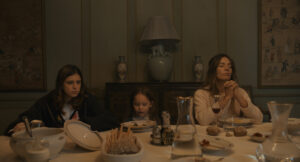Film Review: “Amanda” Finds an Antihero in Existential Crisis
Written by: Hannah Tran | July 6th, 2023

Amanda (Carolina Cavalli, 2022) 3 out of 4 stars.
There isn’t much to Carolina Cavalli’s Amanda besides Amanda, but that’s okay. This Italian directorial debut gets by largely thanks to the charm of its lead character, the relatably lost and lonely titular 25-year-old who has just returned to her affluent family after finishing school. Wonderfully written by Cavalli and perfectly portrayed by Benedetta Porcaroli (18 Presents), Amanda is a chaotic emblem of youthful malaise. As she attempts to reform a childhood bond and connect with society, Amanda is often frustrating, more often sympathetic, and always, always watchable.
Amanda may physically be an adult, but she lives much of her life like a child. She wears the same outfit every day, and the only people she seems to be able to talk to are her kid niece and her family’s maid. Everyone says there is something wrong with her, and they seem to just be waiting for her to change. But Amanda isn’t alone. Everyone, whether they are normal by society’s standards or more like our unconventional protagonist, is moderately dysfunctional in Amanda.

There’s a distinct loneliness that pervades all of their lives. The dingy color palette, electronic music, and barren settings lend an artifice and an emptiness to the world. The Italian exteriors and under-furnished interiors help to reveal character, such as with Amanda’s friend Rebecca’s desolate bedroom or the grimy techno parties Amanda goes to. Compared to the colorless backgrounds, Amanda stands out, and she combats the dark landscapes with the same weapon used by so many young people: a sense of humor.
Amanda is a film that doesn’t take itself too seriously. The stylish flairs play into the deadpan quality that pervades the whole script. Its comedy is often morbid, but it fits the feeling of Gen Z despondency. The dialogue is sharp and smart, and it’s a pleasure to just see our protagonist interact with so many vastly different sorts of people.

Although there’s something familiar about the style, it isn’t so clear as to be derivative. While I’ve seen it compared to Wes Anderson and Yorgos Lanthimos, neither filmmaker seems to be too obvious an influence here. The emotion it elicits is more similar to The Graduate, but this comparison highlights the main flaw with the film, which has more to do with the story than the direction.
Because the plot is not particularly focused on any specific relationship or committed to any one direction, it can feel adrift in its own world. At worst, it feels a bit slight. At best, its apparent weaknesses as a film fit in with those of its main character perfectly, which makes them pretty forgivable.


